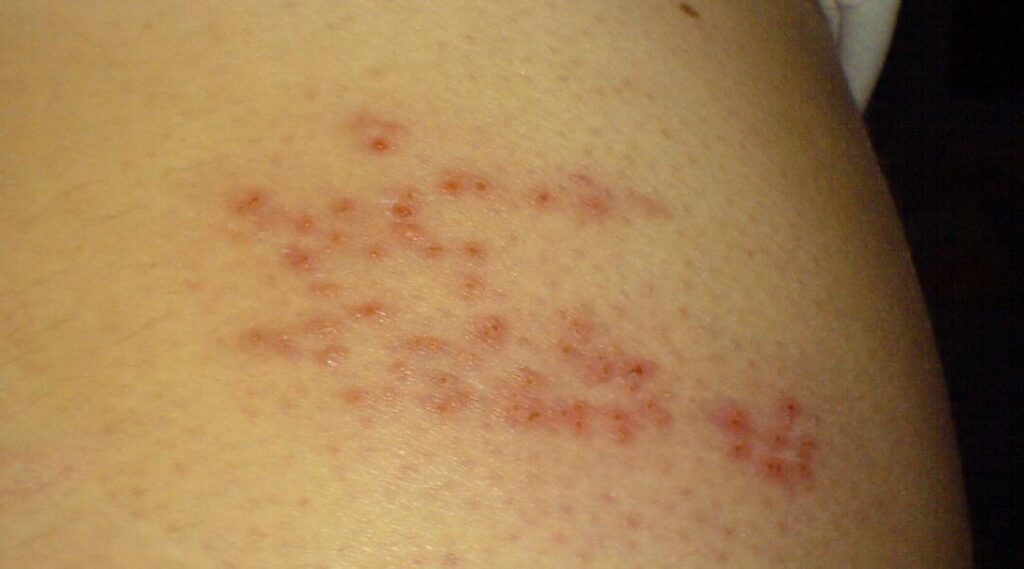Herpes Zoster

What is herpes zoster?
Herpes zoster, also known as shingles, is a viral infection caused by the varicella-zoster virus, the same virus that causes chickenpox. The virus remains dormant in the nervous system after a person has chickenpox, and can reactivate later in life as herpes zoster. It is most common in people over 50 and those with weakened immune systems.
What are the symptoms of herpes zoster?
The symptoms of herpes zoster (shingles) typically include:
- Pain, burning, tingling, or numbness on one side of the body, typically in a band-like pattern.
- A rash that develops into clusters of small, fluid-filled blisters
- Fever and headache
- Fatigue
- Sensitivity to light
- Some people may also experience difficulty in moving, speaking or hearing.
In some cases, complications such as postherpetic neuralgia (PHN) can occur, which is chronic pain that persists after the rash and blisters have resolved.
Is herpes zoster contagious?
Herpes zoster is not contagious from person to person. However, the virus that causes herpes zoster (varicella-zoster) can be spread from a person with active shingles to someone who has never had chickenpox or has never been vaccinated against chickenpox. This can cause chickenpox in that person, not shingles.
People with active shingles should try to avoid contact with people who have never had chickenpox or the chickenpox vaccine, especially pregnant women, newborns, and people with weakened immune systems, as they are at the highest risk of severe illness from chickenpox.
How is herpes zoster treated?
Treatment for herpes zoster (shingles) typically includes:
Antiviral medications to reduce the severity and duration of the infection. These medications can also help to prevent complications such as postherpetic neuralgia. Examples of antiviral medications include acyclovir, valacyclovir, and famciclovir.
Pain management, such as over-the-counter pain relievers, prescription pain medications, and nerve blocks.
Topical creams and ointments, such as calamine lotion, can be used to relieve itching and pain associated with the rash.
It is important to start antiviral treatment as soon as possible, ideally within 72 hours of the onset of symptoms, to reduce the risk of complications.
It’s important to see a doctor if you suspect you have shingles, as early treatment can improve outcomes and prevent complications.
What is post herpetic neuralgia?
Postherpetic neuralgia (PHN) is a complication of herpes zoster (shingles) that occurs when the pain from shingles persists after the rash and blisters have resolved. It is a chronic pain condition that affects the nerves, and it can be debilitating. Symptoms of PHN include burning, stabbing, or shooting pain, as well as sensitivity to touch. The pain can be severe and can last for months or even years.
The risk of developing PHN increases with age, and it is more common in people who have severe or prolonged cases of shingles, or who have underlying health conditions that affect the immune system.
Treatment for PHN include medications such as nerve blocks, antidepressants, anticonvulsants, and other medications, as well as physical therapy and counseling for chronic pain management.
It’s important to note that PHN can be prevented with early treatment of shingles, which is why it’s important to see a doctor as soon as possible if you suspect you have shingles.
How can herpes zoster be prevented?
There are several ways to prevent herpes zoster (shingles):
Vaccination: The shingles vaccine is recommended for people aged 60 and older. It is about 70-90% effective in preventing shingles and PHN.
Boosting Immunity: If you’ve had chickenpox before, you’re at risk of getting shingles. Taking care of your overall health and boosting your immunity can help reduce the risk of shingles.
Avoiding Triggering Factors: If you’ve had shingles before, try to avoid things that might trigger another outbreak, such as stress, sun exposure, and infection.
Early treatment: If you suspect you have shingles, it’s important to see a doctor as soon as possible. Early treatment with antiviral medications can reduce the risk of complications such as PHN.
It is important to note that while these preventive measures can help reduce the risk of shingles, they may not completely eliminate the risk. Also, the shingles vaccine is not recommended for people with weakened immune systems or for those who are pregnant.
When can the results be appreciated after the shot?
Within a week women begin experiencing increase in sexual desire ,sensitivity and pleasure but it usually takes 3 months for the full results to be appreciated .
How long does the effects of the O shot last?
On an average they last upto 12 months but it varies from person to person.
So if you are looking to enhance your bedroom life and pleasure, schedule your O shot at Dr Walia’s Skin and Laser Clinic, Phase 3B1 Mohali by calling us at 9257221456.


